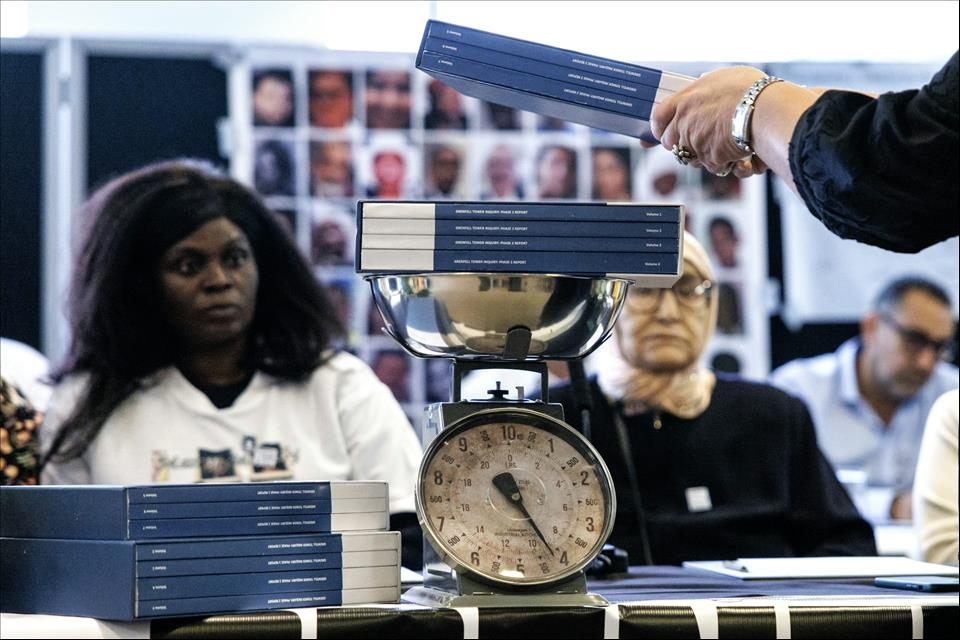
Grenfell Report: The Risk Of Holding Everyone To Account Is No One Actually Gets The Blame
How was it possible for a reinforced concrete building, itself structurally impervious to fire, to be turned into a death trap for 72 of its own inhabitants?
With the publication of the inquiry's final report seven years later, the“path to disaster” is now clear, with the report stating:
Political science has, for many years, examined blame-avoidance strategies . Ministers, officials, regulators and other public servants are generally to be expected to avoid taking the rap for a crisis, calamity or catastrophe.
Blame is a complex business in the political world. And the Grenfell inquiry report refuses to engage in blame games . It instead asserts that many different acts and failings caused the tragedy. The authors state:
What's provided is a detailed analysis of why different actors and organisations should each be apportioned a different“share” of the blame“ but the risk is that this rather fuzzy approach to accountability may be seen as holding everyone and yet no one to account.
Want more politics coverage from academic experts? Every week, we bring you informed analysis of developments in government and fact check the claims being made.
Sign up for our weekly politics newsletter , delivered every Friday.
One of the great benefits of launching an independent inquiry is that it enjoys the time and the space to focus on the facts in an environment which is largely free of partisan influences or direct emotional engagement. In theory, the inquiry members can therefore engage in”slow thinking“ and focus on lessons for the future . They can resist knee-jerk, emotive and punishment-focused impulses and demands to assign blame.
Whether this balance has been successfully achieved in the past has dogged a number of inquiries. The first inquiry into the events of Bloody Sunday in 1972 , for example, was widely viewed as a deliberate attempt to conceal as much as it revealed. The final report of the 2003 Hutton inquiry which investigated the controversial circumstances surrounding the death of David Kelly, a biological warfare expert and former UN weapons inspector in Iraq, was also met with accusations of whitewashing .
Grenfell Tower's construction turned it into a death trap. Alamy/Gavin Rodgers
It's easy for an inquiry to be dismissed as a blame avoidance mechanism – "applying a judicial coat of whitewash to a dirty piece of politics.”
Has the Grenfell inquiry got this balance right? One of the most important elements of the report is that it is not really focused on learning the lessons from Grenfell. It is in fact focused on why there had been a failure to learn from previous fires .
Grenfell was, as the report notes,“the culmination of decades of failure by central government and other bodies in positions of responsibility”. This might, arguably, raise more pointed blame-based questions.
For those affected by the Grenfell disaster the prime minister's apology will offer little salve when the Metropolitan Police is so far resisting pressure to speed up the criminal investigation. It is suggesting that it could take at least 18 months before charging decisions are made against those named as responsible in the report.
Following the report's publication, May admitted , probably in good faith, that everyone, including the government, regulators and companies must“must all acknowledge their part in the history and series of events that led to this tragedy”. But Matt Wrack , general secretary of the Fire Brigades Union, is undoubtedly correct when he notes:
What this points to is the need for transformational change and not just post-disaster tinkering. The scholarly literature on public inquiries is not extensive but what it does show is that something quite specific is broken in the system. Although governments are almost duty-bound to implement most of the recommendations they receive from these inquiries, very few have a transformational impact.
Although public inquiries are Britain's“favoured response” to a crisis, it is not just the recommendations that matter. Change can only happen by following up on those recommendations and maintaining political pressure . The great failure of public inquiries is that too often their recommendations get left on the shelf .
The 1990 Woolf report into prison riots is often held up as a rare example of an inquiry that reframed the way in which a problem was understood and, through this, led to transformational change . Lord Woolf was a canny chair who understood that if transformation and not tinkering was to be achieved, then his role did not end with the publication of the inquiry's final report.
The government will“carefully consider” the findings of the Grenfell Tower inquiry to“ensure that such a tragedy cannot occur again”, the prime minister has said.“Carefully consider” are weasel words in a political context. What can be gleaned from previous inquiries is that if the“systematic dishonesty” uncovered by this inquiry is to lead to systematic change then its likely that Sir Martin Moore-Bick's work has far from ended.

Legal Disclaimer:
MENAFN provides the information “as is” without warranty of any kind. We do not accept any responsibility or liability for the accuracy, content, images, videos, licenses, completeness, legality, or reliability of the information contained in this article. If you have any complaints or copyright issues related to this article, kindly contact the provider above.
















Comments
No comment